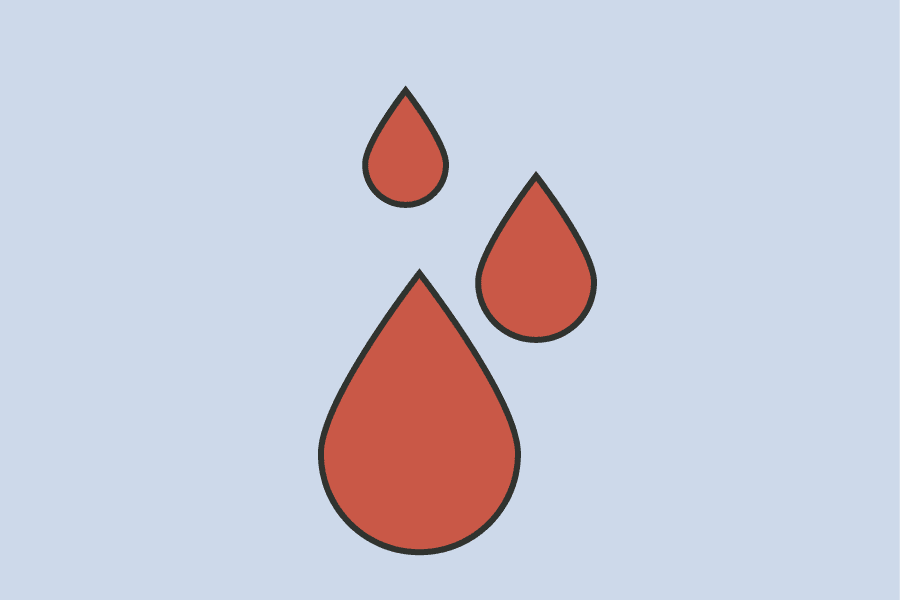Bleeding at the start of pregnancy is common. Many women get worried when they bleed although it doesn’t necessarily mean there is a problem. Bleeding in early pregnancy that stops does not imply a higher risk for the baby at childbirth. You can always call your midwife or healthcare provider if you are worried and have questions. There are many different causes of bleeding in early pregnancy. We’ll review the most common ones and when you need to seek emergency care.
Once you have confirmed that you are pregnant and up until week 11+6, contact your obstetrician or midwife’s office or clinic for advice if it is not an emergency. In case of an emergency, contact the OB/GYN emergency services or hospital emergency department, depending on where you live.
To determine what is causing bleeding, you will have a pelvic exam and an ultrasound, if necessary.
Some reminders about bleeding
- bleeding is common in early pregnancy and does not necessarily mean there is a problem.
- it is not always possible to find the cause of the bleeding.
- there is nothing you can do to prevent bleeding.
- if you are spotting and feel well otherwise, you do not need to seek emergency medical care. You can wait until the next day to contact your prenatal clinic/maternity ward for advice.
Check the color!
- fresh bleeding is light red to dark red.
- reddish brown blood means that the bleeding started earlier and has ended.
Check the volume!
- bleeding is considered heavy when you saturate a pad in one hour or if you experience clotting. If you are bleeding this heavily, seek emergency medical care.
- if you are spotting and feel well otherwise, you do not need to seek emergency medical care. You can wait until the next day to contact your prenatal clinic/maternity ward for advice.
If you are experiencing any of the following symptoms, seek emergency care immediately:
- if you are bleeding, regardless of the volume, and have severe abdominal pain, either on one side of your abdomen or your lower abdomen.
- if you are bleeding, regardless of the volume, and feel generally unwell (you feel ill, faint, dizzy and tired)
- if you are bleeding to such a degree that you soak through a pad in one hour or if you experience clotting.
Bleeding in early pregnancy can have several causes before week 12+0:
Implantation bleeding happens when the fertilized egg attaches, “implants itself”, to the uterine lining (the endometrium). This is the first sign of pregnancy for some women.
Spotting after sexual intercourse, also called post coital spotting. The cervix is more likely to bleed during pregnancy so it’s common to have spotting or blood mixed discharge after sexual intercourse (looks like a dark reddish-brown discharge the day after). There is no reason to be alarmed.
Breakthrough bleeding. At times, when your body has not fully understood that it will stop menstruating bleeding can come from the uterine lining (the endometrium). This is called breakthrough bleeding. It usually occurs about the time your period would have been due. Breakthrough bleedings generally disappear after the first trimester when pregnancy and the placenta fill the cavity of your uterus. Once pregnancy has filled the cavity, there is no longer any lining from which bleeding can occur.
Infection bleedings are typically caused by a bacterial infection in the vagina or cervix, often combined with heavy and/or foul-smelling discharge. This is treated with antibiotics. Always notify your midwife if you notice a change in your discharge (volume, appearance, smell).
Polyp bleedings. A cervical polyp is usually a harmless benign growth on the cervix that bleeds easily. Occasionally, these need to be removed through a simple surgical procedure.
Cell changes. Uncommon in pregnant women, but bleeding from the cervix may be a sign of cervical cancer. Treatment to remove the cancer is possible. It is possible to receive treatment during pregnancy, but the treatment must be modified from case to case depending on how far along the woman is in her pregnancy.
Miscarriage bleeding. A more menstruation-like bleeding could be a sign of miscarriage. You do not need to seek emergency care but can wait and contact your prenatal clinic/maternity clinic for advice. If it is the start of, or an ongoing miscarriage during early pregnancy, there is nothing that can be done to stop or prevent it. Your body can normally take care of this without medical attention.
Ectopic pregnancy is when the fertilized egg attaches itself in a place other than inside the uterus, most often in the fallopian tube. Bleeding in combination with severe pain on one side of your abdomen, often far down, may be a sign of ectopic pregnancy. This can be a life-threatening condition if left untreated since the fallopian tube can rupture, causing massive bleeding in the abdomen. If you have severe pain on one side of your abdomen together with bleeding, you need to seek emergency medical care.
Source:
- Lärobok för barnmorskor. Faxelid, E. Course literature 2001.
- Myles Textbook for Midwives. Fraser, D. och Cooper, M. Churchill Livingstone 2003.
